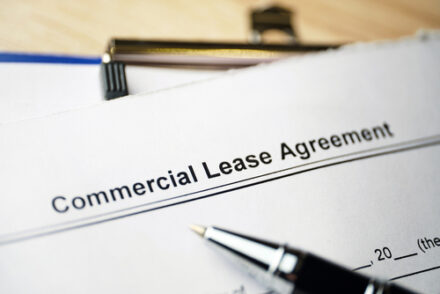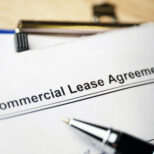
A tenant’s guide to business leases and ‘contracting out’
20th February 2024 by Claire Taylor
If you take a lease of business premises, your landlord may ask you to ‘contract out’ of statutory rights that apply to business tenancies. Before making that decision, you need expert legal advice to understand what rights you are giving up and how that might affect your business in the future.
‘If your business is going well in a great location, you will not want to move premises just because your lease has expired,’ says Claire Taylor, a Partner in the Commercial Property team with Laceys Solicitors. ‘This is why business tenants have a statutory right to stay put and request a new tenancy, unless they have agreed to give up those rights by contracting out before signing the original lease.’
Claire explains the rules on business tenancies and what contracting out means in practice.
Rights of a business tenant
The legal rules on business tenancies are set out in the Landlord and Tenant Act 1954, often referred to simply as the 1954 Act. A lease is usually granted for a fixed term and, currently, most tenants want this to be no longer than five years to allow them flexibility.
If you occupy the premises for the purposes of a business on the day that contractual term ends, the tenancy will continue while you settle what happens next with the landlord. The starting point is that you have the right to ask for a new tenancy on the same terms as the previous one.
The landlord may want flexibility too. If they want to get the premises back, they have a right to object to granting a new tenancy but only for a limited range of reasons, the most common being that they want to redevelop and cannot do this with the tenant in occupation.
If the landlord succeeds in opposing a new tenancy, they must pay you compensation to cover the inconvenience of moving.
When does the 1954 Act apply to a lease?
The key requirements for a business tenancy to continue under the 1954 Act are that:
- the tenant must be in occupation on the last day of the contractual term; and
- must be using the premises for the purposes of a business.
A business does not have to be run for profit, so a charity tenant can still have 1954 Act renewal rights.
Tenancies for six months or less are outside the scope of the 1954 Act, but landlords cannot avoid their obligations by granting a series of short tenancies. If a business tenant has been in occupation for 12 months or more, 1954 Act security of tenure will apply.
The terms of the new lease
If you wish to continue your business tenancy under the 1954 Act, you and your landlord must follow a statutory court process, with the help of your solicitor. Typically, you would request a new lease and the landlord will either agree or oppose it on one of the statutory grounds. There are some complex rules on what proof the landlord must produce, and your solicitor will be able to explain.
If you both agree to the grant of a new lease, the court will set out a timetable for agreeing terms. You will need to negotiate a new lease but if you cannot reach agreement, the court will decide any disputed points.
The starting point is that the new lease should be on the same terms as the old one, but either the landlord or tenant can argue that some changes are required, to reflect the current market or specific circumstances. There will often be a debate over the length of the new term and whether there should be a right to break the lease early.
The most difficult issues arise where the typical terms of new leases granted in the market have changed significantly from what was common when the original lease was granted. A current example of this is that most new leases will now include drafting to cover rights to make energy efficiency improvements and who should pay for them, but the courts will not automatically agree to include these in 1954 Act renewal leases.
Contracting out
This default position for a business tenancy can be changed if the parties agree to contract out. This involves a written agreement that you give up your rights (and security) under the 1954 Act to a new tenancy.
This changes the balance of power between landlord and tenant, as contracting out allows the landlord freedom of choice over whether to offer a new lease at the end of the current one and a free hand to negotiate terms.
You may prefer to keep the bargaining power of 1954 Act security of tenure. But landlords frequently offer to let premises only on a contracted-out basis, so the most important thing is to understand what you are giving up and make an informed decision. In practice, the rent for a contracted-out tenancy may be lower than for one with security of tenure.
The contracting out process involves the landlord giving you a statutory notice, which must include a standard form of warning about the 1954 Act rights being lost. You must then sign a declaration, agreeing to contract out. In most cases, the landlord will want this to be in the form of a statutory declaration, which involves signing it in front of an independent solicitor. The lease will also record the fact that the parties have agreed to contract out.
How we can help
If you are taking a new lease, we can talk you through the pros and cons of agreeing to contract out of 1954 Act security of tenure.
If you are already occupying premises for the purpose of your business, our commercial property experts can explain your rights and help you navigate the lease renewal process.
For further information, please contact Claire Taylor on 01202 377817 or email c.taylor@laceyssolicitors.co.uk
This article is for general information only and does not constitute legal or professional advice. Please note that the law may have changed since this article was published



